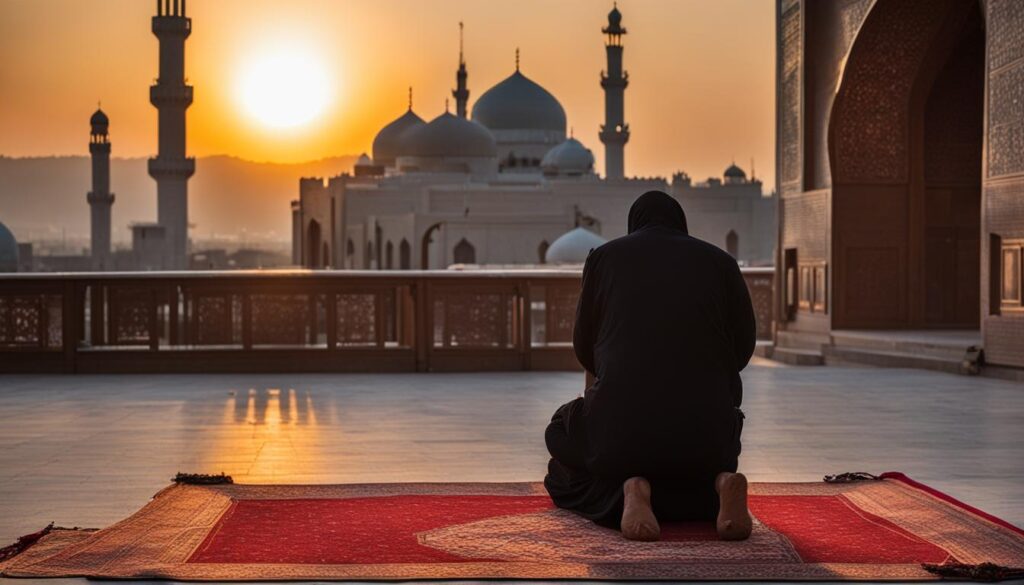Praying in Islam can be challenging for beginners. This easy guide provides a step-by-step resource on how to pray in Islam for beginners. It emphasizes the need for a simple and concise guide to teach the basics of prayer. The guide includes the steps of salah (prayer) and breaks down each rakah (unit of prayer) to provide a clear understanding of the prayer process.
Key Takeaways:
- Praying in Islam is a fundamental pillar of the religion.
- Salah is the first act of worship made obligatory by Allah.
- Performing wudu, the ritual of purification, is necessary before prayer.
- There are five daily prayers in Islam, each with specific times.
- Salah consists of specific actions and movements performed in a prescribed order.
Understanding the Importance of Prayer in Islam
Prayer, known as salah, holds immense significance in the Islamic faith. It is considered one of the fundamental pillars of Islam and is the first act of worship made obligatory by Allah. The importance of prayer is emphasized in the Quran, where it is described as the key to success in this world and the hereafter. Muslims are required to perform salah five times a day at specific times, which helps establish a sense of discipline and spirituality in their daily lives.
Prayer serves as a means of connecting with Allah and seeking His guidance. It is an opportunity for Muslims to purify their souls and seek forgiveness for their sins. Through prayer, Muslims acknowledge their dependence on Allah and express their gratitude for His blessings. Salah is seen as a spiritual practice that helps individuals build a closer relationship with their Creator and attain spiritual fulfillment.
The significance of prayer is not only limited to its spiritual benefits but also extends to the overall well-being of individuals. Praying regularly improves focus, patience, and self-discipline. It provides a sense of peace and tranquility in a world filled with distractions and challenges. Moreover, prayer acts as a reminder of one’s purpose in life and encourages believers to lead a righteous and compassionate existence.
The Spiritual Rewards of Prayer
Prayer in Islam is not merely a ritualistic act; it is an expression of devotion and submission to Allah. The rewards of prayer are plentiful and encompass both worldly and spiritual realms. Muslims believe that through sincere and consistent prayer, they can attain blessings, forgiveness, and protection from Allah. Prayer is a means of seeking guidance, solace, and strength during difficult times.
“Indeed, those who believe and do righteous deeds and establish prayer and give zakah will have their reward with their Lord, and there will be no fear concerning them, nor will they grieve.” (Quran 2:277)
It is important to recognize the immense significance of prayer in Islam and the transformative impact it can have on an individual’s life. By understanding the importance of prayer and approaching it with sincerity and devotion, Muslims can reap the numerous rewards and blessings associated with this essential act of worship.

Steps of Wudu: Purification before Prayer
In Islam, before engaging in prayer, Muslims must perform wudu, a ritual of purification. Wudu involves specific actions aimed at cleansing the body and preparing oneself for prayer. This process helps create a state of physical and spiritual cleanliness, allowing individuals to approach prayer with a focused and reverent mindset.
The steps of wudu are as follows:
- Begin by saying “Bismillah” (In the name of Allah).
- Wash both hands up to the wrists three times, ensuring that water reaches every part, including between the fingers.
- Rinse the mouth and nose three times, using water to cleanse thoroughly.
- Wash the face three times, from the hairline to the chin and from ear to ear.
- Wash both arms up to the elbows, starting with the right arm and then the left, three times. Ensure that water reaches every part of the arms.
- Wipe the head once, using a wet hand from the forehead to the back of the head, and then bring the hand back to the forehead.
- Wash both feet up to the ankles three times, starting with the right foot and then the left. Make sure to wash between the toes and every part of the feet.
- End the wudu by saying the shahada, the declaration of faith, which is “Ashhadu an la ilaha illa Allah, wa ashhadu anna Muhammadan rasul Allah” (I bear witness that there is no god but Allah, and I bear witness that Muhammad is the messenger of Allah).
| Step | Description |
|---|---|
| 1 | Say “Bismillah” (In the name of Allah) |
| 2 | Wash hands up to the wrists three times |
| 3 | Rinse the mouth and nose three times |
| 4 | Wash the face three times |
| 5 | Wash both arms up to the elbows three times |
| 6 | Wipe the head once |
| 7 | Wash both feet up to the ankles three times |
| 8 | Say the shahada |
“The ritual of wudu not only cleanses the body but also prepares the mind and heart for prayer. It is a beautiful act of worship that symbolizes purification and spiritual renewal. By following the steps of wudu, Muslims are reminded of the importance of physical and spiritual cleanliness in their relationship with Allah.”
Understanding the Times of Prayer in Islam
Prayer holds a significant place in Islam, with Muslims required to perform five daily prayers at specific times throughout the day. These prayers, known as Fajr, Dhuhr, Asr, Maghrib, and Isha, have designated times that vary based on the position of the sun and geographical location. Adhering to these specific times allows Muslims to maintain a consistent connection with Allah and seek His guidance.
Each prayer time has its own significance and purpose. Fajr, the pre-dawn prayer, marks the beginning of the day and is a time of spiritual awakening and seeking blessings. Dhuhr, the midday prayer, acts as a break from daily activities to reconnect with Allah and seek His guidance. Asr, the afternoon prayer, serves as a reminder to pause and reflect amidst the busyness of life. Maghrib, the evening prayer, is performed at sunset, symbolizing gratitude for the day’s blessings and seeking forgiveness. Lastly, Isha, the night prayer, offers a time for introspection, seeking forgiveness, and preparing for restful sleep.
It is important for Muslims to be mindful of the times of prayer and strive to perform each prayer as close to its designated time as possible. The strict adherence to prayer times not only strengthens one’s relationship with Allah but also brings discipline and structure to one’s daily routine. It allows individuals to prioritize their spirituality and maintain a constant connection with the divine.
| Prayer Time | Time Range |
|---|---|
| Fajr | Pre-dawn until sunrise |
| Dhuhr | Midday until mid-afternoon |
| Asr | Afternoon until just before sunset |
| Maghrib | Shortly after sunset |
| Isha | Evening until midnight |
Importance of Praying at Designated Times
“Verily, the prayer is enjoined on the believers at fixed hours.” – Quran (4:103)
The importance of adhering to the designated prayer times is emphasized in the Quran, where it is stated that prayer is ordained at specific hours. Praying at these designated times ensures that Muslims are constantly connected with their faith and spiritual obligations. It serves as a reminder that the worship of Allah should be the foremost priority in one’s life.
Prayer times also provide a sense of rhythm and structure to the day, allowing individuals to pause from their worldly pursuits and seek spiritual nourishment. It helps in maintaining a balanced lifestyle, where both the physical and spiritual aspects are given due importance.
By understanding and valuing the times of prayer, Muslims can optimize their spiritual growth, deepen their connection with Allah, and experience the peace and tranquility that comes with regular and timely worship.

Performing Salah: The Basics of Islamic Prayer
Prayer, or salah, is a fundamental aspect of Islamic worship. It is an act of devotion that allows Muslims to connect with Allah and seek His guidance. Salah consists of specific actions and movements that are performed in a prescribed order. By understanding the basics of salah, beginners can establish a strong foundation for their prayer practice.
Steps of Salah
The steps of salah include standing, reciting Quranic verses, bowing, prostrating, and sitting. Each unit of prayer, known as a rakah, follows a similar pattern. The prayer is performed in Arabic, the language in which the Quran was revealed. Recitation of specific verses and supplications adds depth and meaning to salah. It is important to perform each action with sincerity and focus, as salah is a spiritual connection with Allah.
To start salah, the worshipper stands facing the qibla, the direction of the Kaaba in Mecca. The hands are raised to the level of the shoulders, with the intention of beginning the prayer. Then, with hands folded over the chest, the worshipper recites the opening supplication, “Allahu Akbar” (Allah is the greatest), to mark the start of the prayer.
“And establish prayer and give zakah and bow with those who bow [in worship and obedience].” – Quran 2:43
The Importance of Proper Prayer Technique
It is crucial to learn the correct technique for performing salah to ensure that the prayer is performed properly. This includes maintaining proper posture and observing the appropriate actions at each stage of the prayer. Learning from a knowledgeable teacher, imam, or through reliable online resources can help beginners understand the finer details of salah.
By mastering the basics of salah, beginners can embark on a journey of spiritual growth and connection with Allah. It is a practice that promotes mindfulness, discipline, and humility. Salah holds immense significance in the life of a Muslim, providing a means of seeking forgiveness, guidance, and blessings from Allah.
| Step | Action |
|---|---|
| 1 | Stand facing the qibla with hands raised to the shoulders |
| 2 | Recite the opening supplication: “Allahu Akbar” |
| 3 | Recite the Fatiha, the first chapter of the Quran |
| 4 | Perform the ruku (bowing) by bending from the waist, with hands resting on the knees |
| 5 | Recite additional supplications while in the ruku position |
| 6 | Return to a standing position and recite “Sami Allahu liman hamidah” (Allah hears those who praise Him) |
| 7 | Prostrate by placing the forehead, nose, hands, knees, and toes on the ground |
| 8 | Recite additional supplications while in the sujood (prostration) position |
| 9 | Raise the head from sujood and sit briefly |
| 10 | Repeat steps 4-9 for the next rakah (unit of prayer) |
| 11 | After completing the final rakah, offer the taslim (salutation) by turning the head to the right and saying “Assalamu alaikum warahmatullah” (Peace be upon you and the mercy of Allah). Then repeat to the left. |
By following these steps and seeking guidance from knowledgeable sources, beginners can navigate the intricate process of performing salah. The consistency and focus in salah can enrich one’s spiritual journey, fostering a deeper connection with Allah.

Common Mistakes to Avoid During Salah
Performing salah, or Islamic prayer, requires attention to detail and a commitment to performing the actions correctly. However, there are common mistakes that individuals may unknowingly make while praying. Being aware of these mistakes can help ensure that the prayer is valid and performed in accordance with Islamic teachings.
Here are some of the common mistakes to avoid during salah:
- Incorrect recitation of verses: It is essential to recite the Quranic verses correctly during salah. Mispronunciation or improper recitation can affect the meaning of the words and invalidate the prayer. Taking the time to learn the correct pronunciation and intonation is crucial for a valid prayer.
- Improper positioning: Each position in salah, such as standing, bowing, prostrating, and sitting, has specific guidelines that must be followed. Failing to maintain the correct posture or rushing through the movements can impact the validity of the prayer. It is important to take the time to perform each action correctly and with focus.
- Lack of focus and concentration: The purpose of salah is to establish a connection with Allah and seek His presence. It is important to maintain focus and concentration throughout the prayer, avoiding distractions and clearing the mind. Engaging in mindful prayer can enhance the spiritual experience and strengthen the connection with the Divine.
Avoiding these common mistakes and striving for accuracy and mindfulness in salah can help individuals experience the full spiritual benefits of prayer. Taking the time to learn and understand the correct way to perform salah is an important aspect of practicing Islam.

Maintaining the correct order and sequence
While performing salah, it is crucial to maintain the correct order and sequence of the actions. Each unit of prayer, or rakah, follows a specific pattern that should be followed precisely. Starting the prayer with the correct intention, reciting the necessary verses, and performing the movements in the prescribed order are all vital for a valid prayer.
“The Messenger of Allah (ﷺ) said: ‘Prayer is not accepted from anyone who does not face the qiblah (direction of prayer), or there is something between him and the qiblah that is not a sutrah.'” – Sunan Ibn Majah
| Mistake | Correction |
|---|---|
| Reciting verses incorrectly | Take the time to learn proper Quranic recitation and pronunciation. |
| Improper positioning | Ensure each posture is performed correctly and maintain focus throughout the prayer. |
| Lack of focus and concentration | Avoid distractions during prayer and engage in mindful worship. |
By avoiding these common mistakes and striving for excellence in salah, individuals can enhance their spiritual connection with Allah and experience the true essence of Islamic prayer.
Increasing Focus and Mindfulness in Salah
Salah, the Islamic prayer, is not just a physical act; it is a spiritual connection with Allah. To enhance focus and mindfulness during prayer, it is crucial to prepare mentally and emotionally before beginning salah. Reflection and recitation of supplications can help clear the mind of distractions, allowing for a deeper engagement with the prayer. By taking the time to be present in the moment, individuals can enhance the spiritual experience of salah.

One way to improve concentration in salah is by creating a designated and peaceful prayer space. This can be a corner of a room or a specific area that is free from distractions. By setting aside a dedicated space for prayer, individuals can establish a sense of tranquility and focus. Additionally, performing wudu, the ritual of purification, before salah can help in grounding oneself and preparing for prayer.
“True concentration in salah comes from understanding the words and meanings of the prayers. Taking the time to learn and reflect upon the verses being recited can greatly enhance one’s focus and connection with Allah.”
Minimizing external distractions, such as turning off electronic devices and finding a quiet environment, can also aid in increasing focus during salah. It is important to remember that salah is not just a set of physical movements but a means of communication with Allah. By approaching prayer with a mindful mindset, individuals can deepen their spiritual connection and experience the true essence of salah.
Benefits and Rewards of Praying in Islam
Praying in Islam holds significant benefits and rewards for individuals who engage in this act of worship. It serves as a means of strengthening one’s faith and developing a deep connection with Allah. By regularly engaging in salah, Muslims can experience a range of spiritual, emotional, and physical benefits.
First and foremost, praying in Islam helps purify the soul and provides a sense of inner peace and tranquility. It allows individuals to seek forgiveness for their sins and strive for spiritual growth. The act of prayer also aids in the development of self-discipline and self-control, as it requires commitment and regularity in performing the five daily prayers.
Furthermore, praying in Islam is believed to bring numerous blessings and rewards from Allah. It is a means of seeking Allah’s guidance, protection, and support in times of difficulty. The act of prayer serves as a reminder of one’s dependence on Allah and reinforces the belief that true success can only be achieved through His help and mercy.
“Verily, the prayer keeps one from committing indecency and evil, and certainly, remembrance of Allah is the greatest (force). And Allah knows what you do.” – Quran 29:45
In addition to spiritual benefits, praying in Islam also has physical benefits. The movements and postures involved in salah provide a form of exercise and promote physical well-being. The act of bowing, prostrating, and standing during prayer helps improve blood circulation, flexibility, and overall body strength.
Seeking Further Guidance and Knowledge
Once you have familiarized yourself with the basics of praying in Islam, there are various avenues available to deepen your understanding and enhance your practice. Seeking further guidance and knowledge is an important step in strengthening your connection with Allah and fulfilling your religious obligations.
One of the most effective ways to seek guidance is by reaching out to your local mosque or Islamic center. These institutions often offer a range of resources, courses, and programs tailored to different levels of knowledge and experience. Imams and scholars are available to provide personalized support and answer any questions you may have. Engaging with the local Muslim community can also provide opportunities for learning, mentorship, and spiritual growth.
In addition to the mosque or Islamic center, there are numerous online sources, books, and learning materials that can supplement your knowledge of Islamic prayer. Websites, educational platforms, and social media channels provide access to a wealth of information and offer interactive learning experiences. It is important to ensure that the sources you consult are reliable and reputable, using credible scholars and authentic Islamic teachings.
Recommended Resources for Further Learning:
- Online courses and webinars by reputable Islamic institutions
- Books on Islamic prayer and spirituality
- Podcasts and audio lectures by renowned scholars
- Islamic apps that offer guidance and reminders for prayer
By actively seeking further guidance and knowledge, you can continue to grow in your understanding of Islamic prayer and strengthen your relationship with Allah. Remember to approach your learning journey with sincerity, an open mind, and a desire to continuously improve your practice.
Conclusion
In conclusion, this beginner’s guide has provided a comprehensive overview of how to pray in Islam for beginners. It has highlighted the importance of prayer as one of the fundamental pillars of the religion and emphasized the significance of salah in establishing a connection with Allah.
The guide has covered the steps of wudu, the ritual of purification before prayer, and explained the times of prayer in Islam, emphasizing the need to pray each prayer at its designated time. It has also discussed the basics of salah, including the specific actions and movements involved in each rakah.
Furthermore, the guide has shed light on common mistakes to avoid during salah and provided tips to increase focus and mindfulness in prayer. It has highlighted the benefits and rewards of praying in Islam, such as strengthening faith, purifying the soul, and seeking guidance from Allah.
Now equipped with this knowledge, beginners are encouraged to continue seeking further guidance and knowledge from their local mosque or Islamic center to deepen their understanding and practice of Islamic prayer. By doing so, individuals can establish a strong connection with Allah and experience the blessings and fulfillment that come with praying regularly.
FAQ
What is the importance of prayer in Islam?
Prayer, known as salah, is one of the fundamental pillars of Islam. It is the first act of worship made obligatory by Allah. The importance of prayer is highlighted in the Quran, where it is described as the key to success in this world and the hereafter. Muslims are required to pray five times a day at specific times. Salah is seen as a means of connection with Allah, purification of the soul, and protection against sin.
What are the steps of wudu?
Wudu, the ritual of purification, involves specific actions to cleanse the body and prepare for prayer. The steps of wudu include washing the hands, rinsing the mouth and nose, washing the face, washing the arms, wiping the head, and washing the feet. Each step of wudu has its own guidelines and intentions, ensuring that the body is physically and spiritually clean before prayer.
When should I pray in Islam?
Muslims are required to pray five times a day at specific times. These times vary depending on the position of the sun and the geographical location of the individual. The five daily prayers, known as Fajr, Dhuhr, Asr, Maghrib, and Isha, have specific times in which they should be performed. Muslims are encouraged to pray each prayer as close to its designated time as possible.
What are the specific actions and movements in salah?
Salah consists of specific actions and movements that are performed in a prescribed order. These actions include standing, reciting Quranic verses, bowing, prostrating, and sitting. Each unit of prayer, or rakah, follows a similar pattern. The prayer is performed in Arabic, the language in which the Quran was revealed. The recitation of specific verses and supplications is an essential part of salah.
What are common mistakes to avoid during salah?
Common mistakes during salah can include incorrect recitation of verses, improper positioning, rushing through the prayer, and lack of focus and concentration. It is crucial to ensure that each action is performed correctly and with sincerity to fulfill the requirements of prayer.
How can I increase focus and mindfulness during salah?
To enhance focus and mindfulness during prayer, Muslims are encouraged to prepare mentally and emotionally before beginning salah. This can be done through reflection, reciting supplications, and clearing the mind of distractions. Taking the time to be present in the moment can enhance the spiritual experience of prayer.
What are the benefits and rewards of praying in Islam?
Praying in Islam carries numerous benefits and rewards. It is considered an act of worship and obedience to Allah. Praying regularly can strengthen one’s faith, purify the soul, and provide a sense of spiritual fulfillment. It is believed that Allah rewards those who pray with blessings, forgiveness, and protection. Praying also serves as a means of seeking guidance and support in times of difficulty.
Where can I find further guidance and knowledge about Islamic prayer?
After mastering the basics, individuals are encouraged to seek further guidance and knowledge from their local mosque or Islamic center. These institutions can offer resources, courses, and personalized support to help deepen one’s understanding and practice of Islamic prayer. Additionally, there are various online sources, books, and learning materials available for further study.








